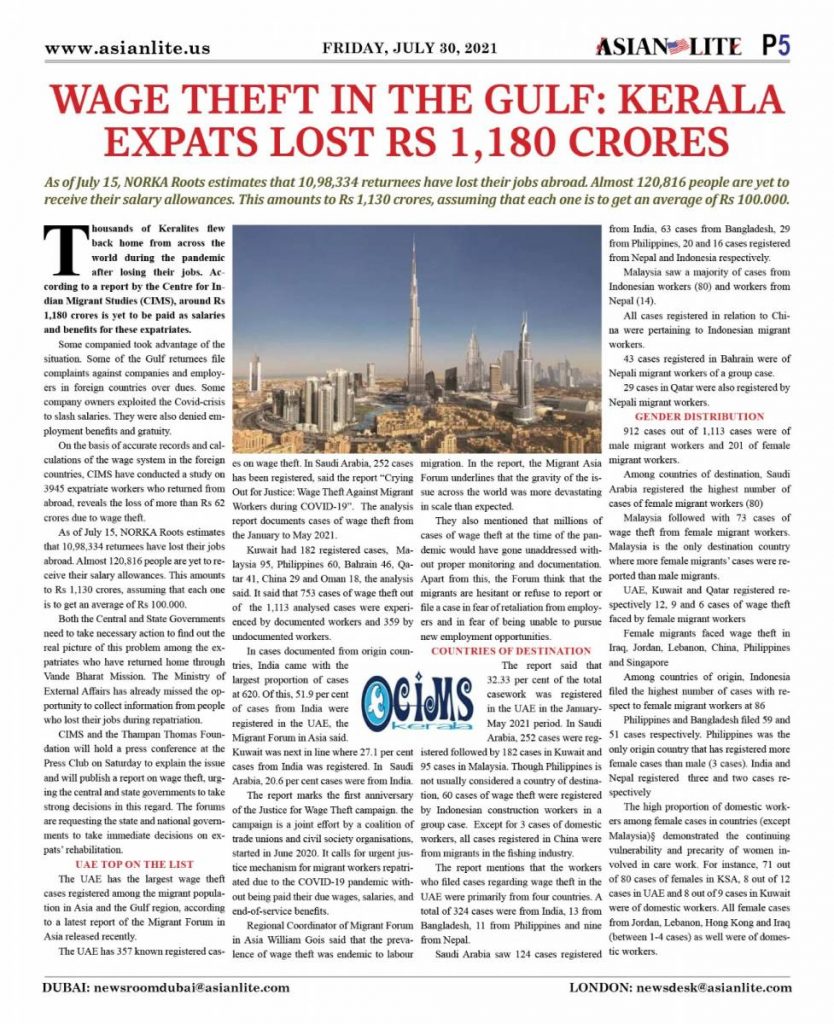As of July 15, NORKA Roots estimates that 10,98,334 returnees have lost their jobs abroad. Almost 120,816 people are yet to receive their salary allowances. This amounts to Rs 1,130 crores, assuming that each one is to get an average of Rs 100.000.
Thousands of Keralites flew back home from across the world during the pandemic after losing their jobs. According to a report by the Centre for Indian Migrant Studies (CIMS), around Rs 1,180 crores is yet to be paid as salaries and benefits for these expatriates.

Some companied took advantage of the situation. Some of the Gulf returnees file complaints against companies and employers in foreign countries over dues. Some company owners exploited the Covid-crisis to slash salaries. They were also denied employment benefits and gratuity.
On the basis of accurate records and calculations of the wage system in the foreign countries, CIMS have conducted a study on 3945 expatriate workers who returned from abroad, reveals the loss of more than Rs 62 crores due to wage theft.
As of July 15, NORKA Roots estimates that 10,98,334 returnees have lost their jobs abroad. Almost 120,816 people are yet to receive their salary allowances. This amounts to Rs 1,130 crores, assuming that each one is to get an average of Rs 100.000.
Both the Central and State Governments need to take necessary action to find out the real picture of this problem among the expatriates who have returned home through Vande Bharat Mission. The Ministry of External Affairs has already missed the opportunity to collect information from people who lost their jobs during repatriation.
CIMS and the Thampan Thomas Foundation will hold a press conference at the Press Club on Saturday to explain the issue and will publish a report on wage theft, urging the central and state governments to take strong decisions in this regard. The forums are requesting the state and national governments to take immediate decisions on expats’ rehabilitation.

UAE Top On the List
The UAE has the largest wage theft cases registered among the migrant population in Asia and the Gulf region, according to a latest report of the Migrant Forum in Asia released recently.
The UAE has 357 known registered cases on wage theft. In Saudi Arabia, 252 cases has been registered, said the report “Crying Out for Justice: Wage Theft Against Migrant Workers during COVID-19”. The analysis report documents cases of wage theft from the January to May 2021.
Kuwait had 182 registered cases, Malaysia 95, Philippines 60, Bahrain 46, Qatar 41, China 29 and Oman 18, the analysis said. It said that 753 cases of wage theft out of the 1,113 analysed cases were experienced by documented workers and 359 by undocumented workers.
In cases documented from origin countries, India came with the largest proportion of cases at 620. Of this, 51.9 per cent of cases from India were registered in the UAE, the Migrant Forum in Asia said. Kuwait was next in line where 27.1 per cent cases from India was registered. In Saudi Arabia, 20.6 per cent cases were from India.
The report marks the first anniversary of the Justice for Wage Theft campaign. the campaign is a joint effort by a coalition of trade unions and civil society organisations, started in June 2020. It calls for urgent justice mechanism for migrant workers repatriated due to the COVID-19 pandemic without being paid their due wages, salaries, and end-of-service benefits.
Regional Coordinator of Migrant Forum in Asia William Gois said that the prevalence of wage theft was endemic to labour migration.
In the report, the Migrant Asia Forum underlines that the gravity of the issue across the world was more devastating in scale than expected. They also mentioned that millions of cases of wage theft at the time of the pandemic would have gone unaddressed without proper monitoring and documentation. Apart from this, the Forum think that the migrants are hesitant or refuse to report or file a case in fear of retaliation from employers and in fear of being unable to pursue new employment opportunities.
COUNTRIES OF DESTINATION
The report said that 32.33 per cent of the total casework was registered in the UAE in the January- May 2021 period. In Saudi Arabia, 252 cases were registered followed by 182 cases in Kuwait and 95 cases in Malaysia. Though Philippines is not usually considered a country of destination, 60 cases of wage theft were registered by Indonesian construction workers in a group case. Except for 3 cases of domestic workers, all cases registered in China were from migrants in the fishing industry.
The report mentions that the workers who filed cases regarding wage theft in the UAE were primarily from four countries. A total of 324 cases were from India, 13 from Bangladesh, 11 from Philippines and nine from Nepal.
- Saudi Arabia saw 124 cases registered from India, 63 cases from Bangladesh, 29 from Philippines, 20 and 16 cases registered from Nepal and Indonesia respectively.
- Malaysia saw a majority of cases from Indonesian workers (80) and workers from Nepal (14).
- All cases registered in relation to China were pertaining to Indonesian migrant workers.
- 43 cases registered in Bahrain were of Nepali migrant workers of a group case.
- 29 cases in Qatar were also registered by Nepali migrant workers.
GENDER DISTRIBUTION
- 912 cases out of 1,113 cases were of male migrant workers and 201 of female migrant workers.
- Among countries of destination, Saudi Arabia registered the highest number of cases of female migrant workers (80)
- Malaysia followed with 73 cases of wage theft from female migrant workers. Malaysia is the only destination country where more female migrants’ cases were reported than male migrants.
- UAE, Kuwait and Qatar registered respectively 12, 9 and 6 cases of wage theft faced by female migrant workers
- Female migrants faced wage theft in Iraq, Jordan, Lebanon, China, Philippines and Singapore
- Among countries of origin, Indonesia filed the highest number of cases with respect to female migrant workers at 86
- Philippines and Bangladesh filed 59 and 51 cases respectively. Philippines was the only origin country that has registered more female cases than male (3 cases). India and Nepal registered three and two cases respectively
- The high proportion of domestic workers among female cases in countries (except Malaysia)§ demonstrated the continuing vulnerability and precarity of women involved in care work. For instance, 71 out of 80 cases of females in KSA, 8 out of 12 cases in UAE and 8 out of 9 cases in Kuwait were of domestic workers. All female cases from Jordan, Lebanon, Hong Kong and Iraq (between 1-4 cases) as well were of domestic workers.
DOCUMENTATION
A total of 753 cases of wage theft were experienced by documented workers and 359 cases by undocumented workers, the report said. Out of 359 cases, 39 cases of undocumented workers were female migrant workers, primarily located in Saudi Arabia and Malaysia. A majority of them were from Indonesia, followed by Bangladesh. Among countries of origin, while Philippines has the highest proportion of documented workers, Indonesia was observed as having the largest proportion of cases related to undocumented workers (58%), followed by Nepal (33.6%).
For documented workers, the major countries of destination where wage theft cases were reported to the platform included UAE (accounting for 44.8% of total cases of documented workers), KSA (30%), and Malaysia (10%). This was followed by (in the order of number of cases) Qatar, Bahrain, Oman, Kuwait, China and Singapore. All cases from Jordan were documented workers. Other countries of documented workers included Hong Kong, Japan, Libya, Maldives, Poland, South Korea, Sri Lanka and Vietnam.
Among countries of destination, the highest number of cases registered on behalf of undocumented workers were from Kuwait, accounting for 61% of the total cases filed between January – May 2021. This was followed by China, KSA (both 9%), Bahrain (8%), UAE (7%), and Malaysia (6%)
A majority of the undocumented cases of wage theft in Kuwait were Indian males in the construction industry. The cases registered in Philippines were Indonesian males who were employed in the manufacturing sector. Cases registered in China were primarily undocumented Indonesian males working in the fishing sector. In all situations, cases were filed as part of a group.










